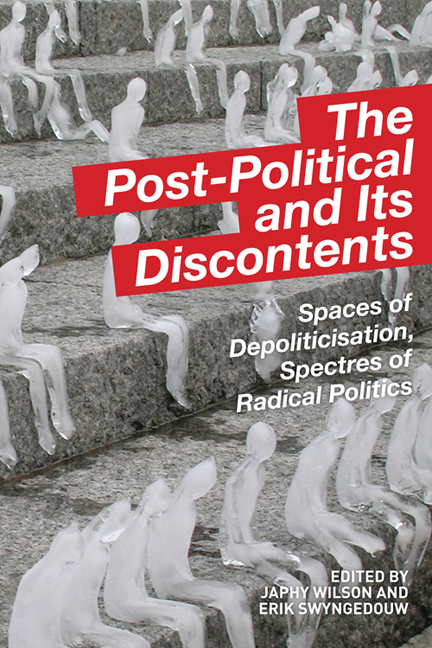Book contents
- Frontmatter
- Contents
- List of Contributors
- Seeds of Dystopia: Post-Politics and the Return of the Political
- Part I Spaces of Depoliticisation
- Part II Spectres of Radical Politics
- 8 Insurgent Architects, Radical Cities and the Promise of the Political
- 9 The Limits of Post-Politics: Rethinking Radical Social Enterprise
- 10 Neither Cosmopolitanism nor Multipolarity: The Political Beyond Global Governmentality
- 11 Against a Speculative Leftism
- 12 Spatialising Politics: Antagonistic Imaginaries of Indignant Squares
- 13 After Post-Politics: Occupation and the Return of Communism
- 14 The Enigma of Revolt: Militant Politics in a ‘Post- Political’ Age
- There Is No Alternative
- Index
13 - After Post-Politics: Occupation and the Return of Communism
from Part II - Spectres of Radical Politics
Published online by Cambridge University Press: 05 August 2016
- Frontmatter
- Contents
- List of Contributors
- Seeds of Dystopia: Post-Politics and the Return of the Political
- Part I Spaces of Depoliticisation
- Part II Spectres of Radical Politics
- 8 Insurgent Architects, Radical Cities and the Promise of the Political
- 9 The Limits of Post-Politics: Rethinking Radical Social Enterprise
- 10 Neither Cosmopolitanism nor Multipolarity: The Political Beyond Global Governmentality
- 11 Against a Speculative Leftism
- 12 Spatialising Politics: Antagonistic Imaginaries of Indignant Squares
- 13 After Post-Politics: Occupation and the Return of Communism
- 14 The Enigma of Revolt: Militant Politics in a ‘Post- Political’ Age
- There Is No Alternative
- Index
Summary
In 2011, Europe and the USA experienced the most significant political movement on the Left since 1968. Weirdly, a vocal portion of those participating claimed that the occupations, demonstrations and assemblies were not in fact political: theirs was a politics of no politics. Why would they say this?
On the one hand, people were signalling that they were not interested in the usual politics of cynical, compromised parties. They were alerting everyone – governments, neighbours, world – that they were not going to be contained, channelled and reduced to the corrupted terms of the dominant electoral systems. But the other, speculative, hand is more interesting: people were claiming that their movements were not political because they had absorbed the ideological message of democratic hegemony – ours is a post-political era. Democracy has won. Since it has defeated all competing political ideologies, the only remaining political task is extending it, enforcing it, tweaking the procedures, refining the process. In such an era, the primary concerns are inclusion, participation and discussion rather than the fundamental antagonism of class conflict.
Spain, Greece, Occupy, on the heels of and inspired by Tunisia and Egypt, allied with protests against cuts in the UK and Madison, Wisconsin, these movements of hundreds of thousands of people in protest against inequality, austerity and the expropriation of lives and futures reset the political course of the second decade of the twenty-first century. Construing them in post-political terms not only repeated a serious theoretical mistake, but also unnecessarily fettered their movement toward economic egalitarianism. Occupiers, the precarious and those resisting austerity too often spoke and thought in post-political terms of democracy even as their struggles pushed in directions historically associated with the name communism.
Two steps back
During the 1990s, a peculiar diagnosis of the political condition of Europe and the US became prominent. We were said to be ‘postpolitical’. This was a curious diagnosis for various reasons. The countries formerly part of the Soviet bloc were actively writing new constitutions and developing new political practices. The US Right was engaged in rabid, focused, culture wars at multiple levels.
- Type
- Chapter
- Information
- The Post-Political and Its DiscontentsSpaces of Depoliticisation, Spectres of Radical Politics, pp. 261 - 278Publisher: Edinburgh University PressPrint publication year: 2014



